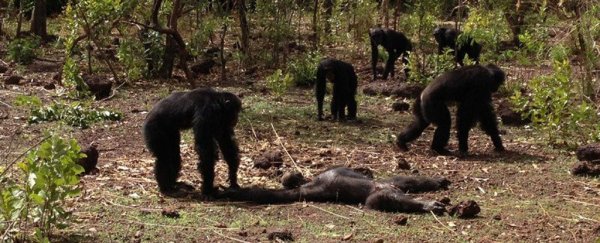Scientists have observed the aftermath of an incredibly rare phenomenon in the animal kingdom: the group killing of a chimpanzee by other animals in the community.
The killing was only the ninth documented case of its kind and the first in West Africa, bringing about the violent end of a 17-year-old chimp called Foudouko: a former alpha male and "tyrant" who once led the group, before being forced into exile by a band of younger males.
Researchers studying the group couldn't actually see the killing – as it occurred in darkness – but they could hear the screams and calls during the deadly attack.
While chimpanzees are highly aggressive, with previous research on multiple groups finding lethal conflicts are common, most killings are the result of fighting between different groups of chimps.
What makes this event so rare is that a 'coalition' of animals from one group acted together to kill a member of their own group, which scientists have only observed a small number of times before.
The killing took place in 2013, and the researchers studying the group, led by anthropologist Jill Pruetz from Iowa State University, have spent the years since analysing the chimps' behaviour and putting together a timeline of the group's history.
They published their findings last week in the International Journal of Primatology.
Recounting the episode, the team explains that when they awoke the morning after the killing to inspect the site, they witnessed an even more disturbing scene: chimps abusing and cannibalising Foudouko's limp corpse over a period of 4 hours.
"It was very difficult and quite gruesome to watch," says Pruetz. "I couldn't initially make sense of what was happening, and I didn't expect them to be so aggressive with the body."
Pruetz had studied chimpanzees in the area since establishing her research site in Fongoli, Senegal, back in 2001, but nothing prepared the team for the displays of aggression Foudouko's old companions directed at his lifeless body.
The animals' former leader had a deep bite on his right foot, a gash along his back, a ripped anus, and cracked ribs.
The researchers think loss of blood from the foot injury was what ultimately killed him during the night, and injuries on his fingers suggested the chimps had bitten at his hands in an attempt to hold Foudouko in place during the fatal beating.
The morning after his death, with the researchers looking on, the animals continued to beat at Foudouko's corpse, hitting it with sticks and rocks, biting at it, tearing out his throat, and even eating some of his flesh.
It was a macabre send-off for a once-strong leader that the researchers first identified as the group's alpha male in 2005.
Foudouko's aggressive domination of his group actually led one of the research assistants to nickname him Saddam, in reference to the Iraqi dictator Saddam Hussein.
But the alpha's leadership came to an end in 2007, when Foudouko's lieutenant – the beta male, Mamadou – was injured.
With his primary supporter weakened by the injury, a group of younger males cast Foudouko out of the group, where he lived in isolation for a period of five years, sharing only fleeting contact with his former companions and underlings.
"It really struck us that Foudouko lived on the outskirts for so long," says Pruetz.
"Chimps are very social, so this type of isolation would be a huge stress, and it seemed Foudouko wanted to get back into the social group."
In 2013 – the year Foudouko was killed – he attempted to re-enter the community.
While Mamadou (still a beta) and Mamadou's brother, David (now the alpha) accepted Foudouko, others in the group didn't seem too pleased to see the outcast chimp return.
"We just happened to have at the time five young males all coming up in the hierarchy, and those guys together didn't want to let Foudouko back in," Pruetz told Chelsea Whyte at New Scientist.
"He was trying to come back in at a high rank, which was ultimately a foolish thing to do on his part."
One night, the tension broke, leading to the extremely rare event of a group chimpanzee attack on one of their own – most likely led by some of these young males.
While the researchers can't be sure of the motivation for the killing, they say it's likely to do with sex, as opposed to pure resentment from Foudouko's former treatment of the animals.
In the Fongoli community, males outnumber females, so if Foudouko had approached a female in heat, it could have been enough to inspire an attack, which descended into a communal kill.
"Killing enemies is pretty easy to explain, but killing your friends is a puzzle," anthropologist Michael Wilson from the University of Minnesota, who wasn't involved with the study, told National Geographic.
"There's this really interesting tension between cooperation and conflict. It makes me think of The Sopranos."
The researchers suggest that if Foudouko had been more submissive when he re-entered the group, he might never have been attacked. But his apparent eagerness to find a mate – which may have stoked fears that the tyrant was seeking a return to power in the group – may have signed his death warrant.
Years later, competition among the males in the group is still fierce, but there have been no more group killings – although shuffled leadership remains a constant.
In the current group, Mamadou has been outcast and has not been seen by the researchers in some time. His brother David still holds onto power as the alpha male, but has been challenged in attacks from younger males.
"Every once in a while, something will happen that makes me think that maybe [Mamadou] is still out there," Pruetz told Michael Greshko at National Geographic.
"If he is, he's being a lot more savvy than Foudouko."
You can find out more about the incident in the video below:
The findings are reported in the International Journal of Primatology.
